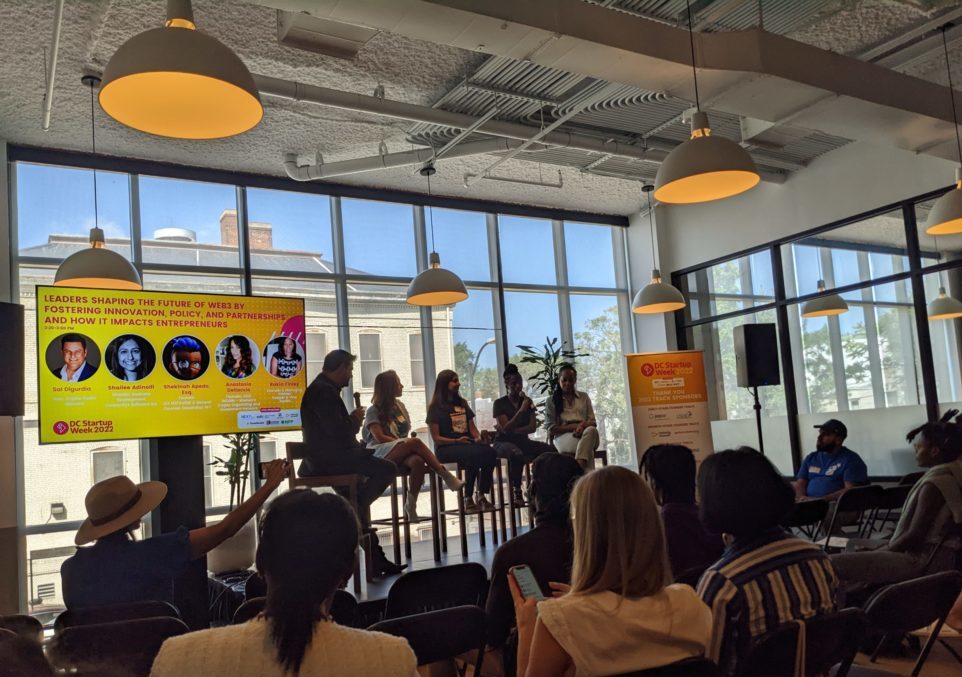When faced with a technology as new as the emerging universe of Web3, it can be hard to imagine just how far and wide the applications can go.
But that doesn’t mean people aren’t thinking about the next phase. During the DC Startup Week panel Leaders Shaping the Future of Web3 by Fostering Innovation, Policy, and Partnerships and How It Impacts Entrepreneurs, community leaders spoke on what’s down the road for the next phase of the internet. Panelists Anastasia Dellaccio, Shailee Adinolfi, Shekinah Apedo and Rakia Finley — all professionals in the space —offered their thoughts on the topic.
As many conveyed during sessions throughout the week, Web3 is still in its infancy with plenty of room for growth. That means that there’s a responsibility to build it properly while understanding biases, economic disparities and utilizing data, said Finley, a founding partner at Copper and Vine.
“We have these opportunities, but at the same time, we talk about economic disparity; at the same time, we talked about systematic oppression; at the same time, we talk about the lack of integrity,” Finley said during the panel. “So what happens when we match these conversations? Well, we begin to be honest about the responsibility initiative. So, we still get to build really important things, but we get to be more intentional about how we implement them and who we are implementing them to.”
From a regulation and policy standpoint, Dellaccio noted that Web3 and the metaverse are unlike other creative industries like art, where the repercussions of new technologies aren’t monitored as closely. But Web3 does have an advantage as more policy and regulation is created around it — technology has been through this before with the initial creation of the internet. At the time, many thought the technology would only be used for more salacious activities.
“With the understanding that we want to foster innovation in the right way, we don’t want to overregulate, but we also want to make sure that we’re keeping people safe, too,” Dellaccio said. “And I think it’s this really delicate balance — and, like everything else nowadays, it’s politicized.”
But there’s room to grow in the existing technology, too. Namely, the lack of streamlining in cryptocurrency and digital wallets requires third-party sites to purchase coins and can’t be used when traveling internationally. And while that might be difficult enough for technologists and those who grew up with technology, it’s even more difficult for older generations, so there’s still more work to be done.
“What we really are doing at this point is cultivating a land,” Finley said. “Web3 is almost like universal farming, right? That’s what we’re trying to do. We want to say, here’s this fantastic land that we’ve laid out that has this infrastructure that, if you put a seed in it, that’s opportunity to grow.”
At some point, the panelists said, many will also want to step out of the current world and infrastructure of Web3 in the US and into other markets. Building businesses within that requires still taking advantage of the technology that exists while also building new integrations and add-ons. That looks like open, transparent systems, data pricing control and permissionless components to keep things as accessible as possible.
But to truly move forward in Web3, noted ConsenSys Software director Adinolfi, is to continue creating and finding new pathways for the technology. In the NFT boom, she observed, some creators made NFTs, did a drop and then had no idea what to do next. Web3 technologists need to make sure that doesn’t happen across the board.
“We need to innovate our way into the next bull market and see what is valuable to users,” Adinolfi said. “That’s really going to be the problem to solve.”







